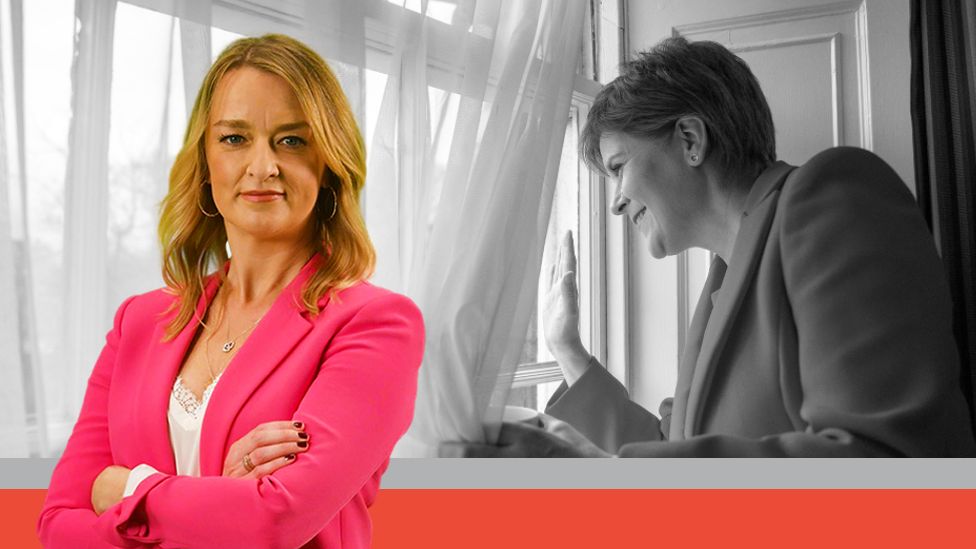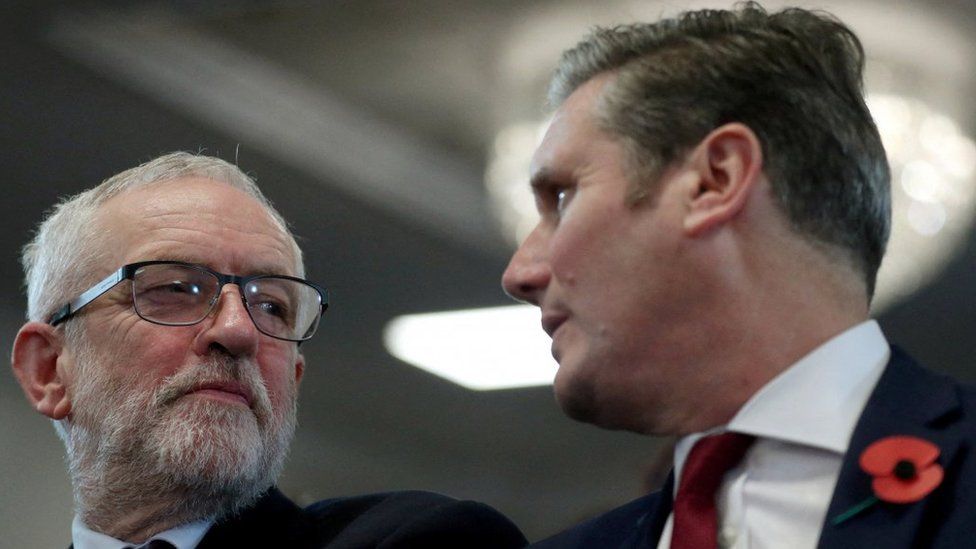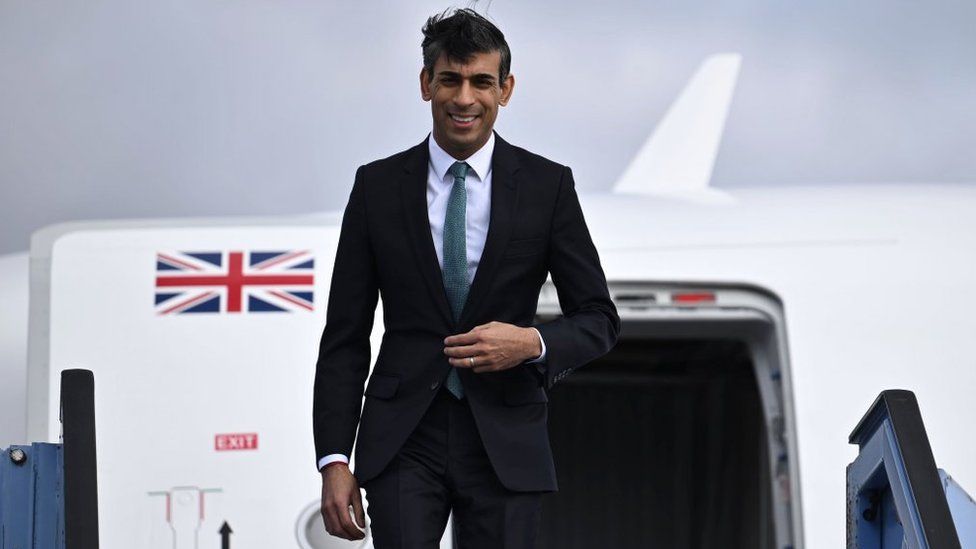In three crucial ways, the landscape shifted – and the result could shape the next general election.
 Image source, PA Media/BBC
Image source, PA Media/BBCHalf term in February. Kids bored at home. MPs away from Westminster. Not much is meant to happen, right?
Blink and you would have missed it, but these quiet mid-winter days, according to one government minister, witnessed a “draw-the-line moment where a new chapter opens”.
One veteran political campaigner reckons we have just lived through the week “that changes the next election”.
Why? Well, in the same few days, Nicola Sturgeon quit. Keir Starmer told Jeremy Corbyn in plain terms that he couldn’t run again as a Labour MP. And a Conservative Prime Minister edged close to resolving the tangle over the Northern Ireland Protocol, the last vestige of the long-running arguments over Brexit.
(Before you scream, that doesn’t mean there won’t be more clashes between the EU and the UK. It certainly doesn’t meant the effects of departing the bloc won’t still be felt. But fixing the protocol, which you can read about here, would represent the end of the negotiation process that has dragged on and on for years.)
The first minister’s presence in UK politics, Jeremy Corbyn’s shadow over Keir Starmer’s leadership and the Conservatives’ fraught conversations over Northern Ireland have been fixtures of our politics for years.
The combined effect of removing those three factors could be immense. But, as ever in politics, beware pundits making grand assertions – so let’s take each issue in turn.
Just a few weeks ago, Nicola Sturgeon told us she had “plenty in the tank“. But after a huge controversy over gender rights that left the consummate professional struggling to get her words straight, that fuel ran dry.
The specific timing of her exit was a shock, but it has been clear for some time that the first minister felt she was edging towards the exit. That is why it was worth asking her how long she intended to serve when we sat down with her.
Her departure matters hugely. Many in the SNP felt “gutted”, as one of her colleagues wrote.
But there was glee at the news elsewhere. One minister told me they “punched the air” when they heard.

- On the show this week is Leader of the House of Commons Penny Mordaunt and Shadow Home Secretary Yvette Cooper
- We’ll hear from Wendy Sherman, US deputy secretary of state
- The actor Hugh Jackman joins the show
- Watch live on BBC One and iPlayer from 09:00 GMT on Sunday
- Follow latest updates in text and video on the BBC News website from 08:00

For all her unrivalled success in elections, Nicola Sturgeon had become someone who divided the public, too. Just as there was a group of well-wishers outside her official residence in Edinburgh as she left, there was a different group who held a celebratory conga in Glasgow’s George Square.
Now the political impact is being pored over. Labour sources are pointing already to polls that show them edging closer to the SNP. One insider calls it a “massive game-changer”, which puts Labour closer to gaining a majority at the next general election.
It is not unreasonable to assume that without their formidable and seasoned leader, without a settled strategy on independence, the SNP will be an easier opponent.
It’s also not daft for Conservatives to imagine that the SNP’s push towards independence could be a lot easier to resist when its most formidable voice has left the stage. An independent Scotland without Nicola Sturgeon? Imagine Brexit without Boris Johnson – a very, very different campaign.
And when it comes to managing relationships between Holyrood and Westminster, with a highly experienced and wily politician out of the way there is perhaps less chance of the UK government ending up in knots.
But wise heads on the unionist and SNP sides caution at jumping to dramatic conclusions. The SNP’s dominance in Scottish politics is profound.
The Scottish public is more or less evenly split on the question of becoming an independent country one day and that has been the case for years. Labour right now has a measly one Scottish MP in Westminster.
And while the SNP does not have an immediately obvious compelling successor with a massive presence, that is not to say that a real talent could not emerge. And don’t forget, the Conservatives have for years played up Nicola Sturgeon as a political bogeywoman. That campaign trick could lose its power.
One minister told me: “The threat of Sturgeon is what kept us unionists together.” With her exit, how will they respond?
There’s no question overall that her departure has shifted the dial. But a shadow cabinet minister carefully says “it’s an opportunity” rather than an assumption that the seats will automatically turn red again – Scotland was once Labour’s heartland, but that was a very, very long time ago.
What has mattered, too, for the party’s leadership this week was Keir Starmer making clear that Jeremy Corbyn will not stand again as a Labour MP. In a way, like Nicola Sturgeon’s departure, this has been coming for a while, but the choosing of a moment is significant.

Image source, Reuters
For Keir Starmer’s team, it is another step on the road to show, with every sinew, that the party has changed since its calamitous defeat in 2019.
It has been a slow and painful process. There are very public tensions with the left wing of the party, not just because of Jeremy Corbyn’s exclusion, but also because Keir Starmer has ditched some of the promises he made when he ran to be leader.
But as ever in politics, private fights inside political parties can be put to public use. Cynics might even suggest (surely not) sometimes they are picked on purpose.
Keir Starmer obviously feels strongly and genuinely that ridding the Labour Party of antisemitism was vital, that it was a shameful episode in the party’s history, and the public verdict that the party had changed was essential. (You can read more about the latest report from the Equality and Human Rights Commission here.) He also obviously feels that it is impossible for Jeremy Corbyn to represent Labour again.
Mr Starmer’s decision closes down the possibility that Jeremy Corbyn could be back on the party’s benches again. (That doesn’t mean, however, that he and his supporters still won’t try to make it happen).
Crossing the former leader’s name off the list can’t make the issue completely disappear. One Labour insider said: “Starmer is working hard on this because it is still a problem – the fact that he is talking about Corbyn and making it a priority shows it is still an issue.”
Nonetheless, the decision this week is an important symbol, as Keir Starmer moves his party on.
What about the prime minister’s effort, then, to end a saga of many years and thousands of column inches? Is Rishi Sunak really on the verge of changing the landscape, too?

Image source, PA Media
This weekend he is in what Number 10 believes could be the closing stages of tortuous negotiations with Brussels to make the Northern Ireland Protocol work – that’s the special deal that was worked out as we left the EU to avoid having a hard border on the island of Ireland. To the horror of some unionists, it meant that Northern Ireland is treated differently to the rest of the UK. You can read more about this weekend’s talks here.
There are the classic advance grumblings and warnings from the Brexiteer ranks of the Conservative Party, and the Northern Irish DUP, that if the deal isn’t good enough, they won’t back it, and ultimately the stalemate could just drag on.
But a deal seems much closer than it has at any previous point. With an agreement possible in the next couple of days, a vote has been pencilled in for Tuesday to approve the package. If it gets that far, Rishi Sunak just might be about to end an argument that plagued his party for years.
It’s not that Tory backbenchers were ever particularly concerned about sending British sausages to Northern Ireland – it’s that the row over the protocol became the totem for the bitter hangover of the Brexit years.
Downing Street is unlikely to be able to push a deal through without a political rumpus, alongside janglings of nerves that Boris Johnson could pile in too.
But if the deal gets done, and the prime minister gets it through Parliament, a Tory source says it would “show he’s a serious guy who can get stuff done and he’ll get credit for that”.
One loyal minister suggests it would be a major win if Mr Sunak can “take on” the right of his party – the “difficult wing”, they call them.
With legislation on small boats expected in the next couple of weeks too, the hope in loyal Conservative quarters is that slowly, carefully, the party will re-earn the right to be heard.
This is politics, though. It’s also entirely possible that Rishi Sunak is about to provoke an almighty row – with the DUP furious, some of his backbenches cross too and his authority under pressure.
But this is not 2019 anymore – the potency of attacks from the most ardent Brexiteers has faded, not least because some of them are in Rishi Sunak’s government, and some of the others are spending a lot of time in TV studios.
There are then, three really important ways in which our politics has been shifting.
The ideas that Scotland will suddenly stop arguing about the constitution, Labour’s factions will cease fighting or the Tories won’t wind each other up about Europe any more are crackers.
The notion, too, that somehow the outcome of the next election has just been decided is daft.
But this is a moment of transition – the fixings of much of the last few years of politics have come loose.